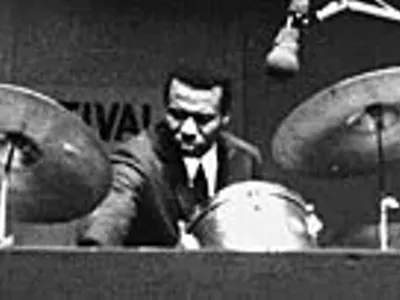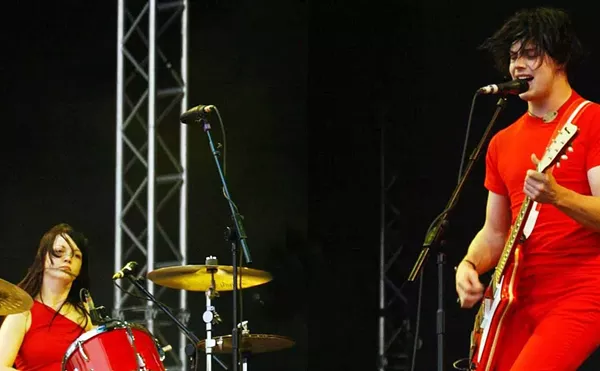
Audio By Carbonatix
[
{
"name": "GPT - Leaderboard - Inline - Content",
"component": "35519556",
"insertPoint": "5th",
"startingPoint": "3",
"requiredCountToDisplay": "3",
"maxInsertions": 100,
"adList": [
{
"adPreset": "LeaderboardInline"
}
]
}
]
Legowelt
Question: What happens when you put Chicago Acid, revolutionary Detroit Techno and Italian disco influences into the hands of a Dutch lunatic, who describes himself as an “international music mercenary fighting against media retardism”? Answer: no doubt some very, very sick shit that nearly defies categorization.
Legowelt (real name Danny Wolfers) also adds a little ghetto-tech here, some punk rock attitude there, to produce some of the freakiest electro on the planet. His notable works include “Total Pussy Control” and “Stumvogel” from the Pimpshifter EP, and the club smash, “Disco Rout,” which also appeared on Ann Arbor label Ghostly International’s 2002 comp, Disco Nouveau.
The last time Legowelt was in town, he rocked the Detroit Art Space with his techno-hippie mates from Holland’s Bunker label. Bring your plugs to Movement’s Underground Stage and to Oslo for an after-party performance on Friday: Legowelt likes to amp it up to earsplitting volumes. —Walter Wasacz
Kelvin Larkin
Once just known as Kenny’s brother, the younger Larkin has emerged into a formidable talent in his own right, dedicating his talents more to the breezy, sexy and intelligent side of house music than the more abstract realms of his brother’s native techno. Now relocated to Los Angeles with his brother, Larkin of late has had residencies at various house nights, opening for such West Coast funky, sexy house luminaries as David Alvarado, reminding dance music audiences that just because it’s from Detroit doesn’t mean it has to be stiff-lipped techno. His aesthetic reflects what the DJs listen to on their own time without dipping too much into esoteric tastes, reminding us that before techno was legendary, classic, important, it was also really fucking fun to dance to. —Hobey Echlin
Garth Trinidad
The host of Los Angeles’ KCRW public radio’s “Chocolate City,” Trinidad is the Southland’s contemporary incarnation of the Electrifyin’ Mojo for Angelenos. Mixing vintage soul cuts and decades-old funk classics like a former Black Panther teaching music appreciation at a community college while solidly supporting less-bombastic underground hip hop (Slum Village) and all those groups (NERD, etc.) that don’t fit into most urban radio programming or alt-rock formulas, Trinidad has become synonymous with a late-night L.A. sound that can best be described as black-and-proud-without-being-too-loud. Though family commitments have scaled back his on-air time (his weeknight show is now on Saturday nights), Trinidad’s warm timbre (again, reminiscent of Mojo) and rarefied soul-speak make him a beacon of positivity and all-embracing for a city and a sound that his playlists strive to bring together, if not one nation, then at least three hours a week under a groove. He does what he can, and, boy, does he. More info: www.kcrw.com. —Hobey Echlin
Kenny Larkin
After a stint in the U.S. Air Force, the outspoken Larkin first came on the Detroit scene in the early ’90s with the likes of Detroit second wave technocrats Carl Craig and Richie Hawtin, releasing records first on Hawtin’s then-nascent Plus 8 label. Larkin shrewdly carved out his own classic Detroit sound, taking the rhythmic charge of Kevin Saunderson and the improvisational emotion of the best Derrick May, which led to 1995’s classic album, Metaphor, for Belgium’s genre-defining techno label R&S. Out of the studio, he made local headlines when he was shot in an apparent robbery attempt in the mid-’90s in front of his Birmingham apartment. Undaunted, he founded his own Art of Dance label, and has turned his take on techno into a cottage industry to bankroll his current career tack in Los Angeles as a stand-up comic, balancing mid-week comedy club showcases (f’real) with weekend trips overseas to DJ. Hey, it’s a living. A new album, The Narcissist, on Peacefrog, shows Larkin is still in the game, while he says there is talk of him and the also-now-L.A. based Tricky — yes, the mid-‘90s trip-hop phenomena — recording together — if the comedy thing doesn’t work out, of course. —Hobey Echlin
Recloose
The artist formerly known as DJ Bubblicious was just another U-M student in the mid-’90s with a bigger taste for hip-hop records than hitting the books. After graduation, Matt Chicoine moved to Detroit, traded in his degree for a job slinging sandwiches at the Russell Street Deli, and set up shop near Wayne State making beats. As legend has it, one day Detroit techno fat cat Carl Craig (you know, the guy that started what was then called the DEMF five years ago) strolled in for a sandwich and Chicoine slipped him a demo-tape-on-rye. Suitably impressed, Craig signed Chicoine, now rechristened Recloose, and the result has been one of Detroit great genre-mashing electronic artists. While his early work on the Craig’s Planet E label spoke more to Chicoine’s eclectic DJing style and taste for vintage electro and hip hop (check out his debut EP So This Is The Dining Room?), his 2002 full-length Cardiology showed a true maturation and refinement in his sound, especially on the gorgeous, awe-inducing track “Kapiti Dream,” owing equally to Craig’s production assistance as Chicoine’s relocation to, of all goddamn places, New Zealand. —Hobey Echlin
DJ Highfish
When DJ Highfish (aka Marcin Kozlowski) played a Halloween party here in 2002, he visited Hamtramck to get back in touch with his Polish roots. He shopped for clothes at Detroit Threads, bought souvenir badges at the Polish Art Center and had coffee at the defunct Urban Break. Later the same night, creepily attired as a flasher, he threw down a delirious mix of minimal house, the gnarz-techno trash of fellow Berliner T. Raumschmiere and topical UK hip-hop (The Streets). This stunning set, played on a laptop using Ableton Live software (DJ Highfish’s 2001 mix CD, Nighteffect, is a benchmark recording of digital mixing using Ableton technology) was witnessed by only a few dozen people. Expect a breakout party of sorts as more of Detroit gets to see the DJ who’s ruled the Berlin underground since beginning a residency at Berlin’s famed WMF Club in 1997. Highfish appears at Movement and at an after-party Saturday at Oslo, along with Barbara Preisinger (Scape Records). —Walter Wasacz
Mike Huckaby
The Charles Bronson of Detroit techno, Mike Huckaby, has been holdin’ it down for more than a decade, watching techno come and go, its pretty-boy globe-trotting playboys rise and fall from his vantage point at Detroit techno home base, the dance room at Roseville’s Record Time, where he works as record buyer and manager, overseeing all the dance vinyl sold, for all intents and purposes, in Detroit proper. Irony being, with all the hyperbolic boasting of technocrats selling millions overseas, he is probably the lone techno artist who can claim to have sold more than a million records on his home soil, albeit 12-inches by other people. Huck has built his no-BS reputation as a solid DJ at the front lines of the local scene (hey, he knows who’s buying what all day when it comes to dance vinyl), which has won him the respect of fellow DJs, so much so that he has played such coveted gigs as Juan Atkins’ Metroplex Records, remixed such back-in-the-day techno icons as Eddie Fowlkes, and even broken off a bit of that globe-trotting DJ thing himself and played Berlin’s Love Parade. After recording singles for the techno-rejuvenating Harmonie Park label, Huck founded his own label, Deep Transportation, dedicated to his hard, dark but still house-adjacent version of Detroit techno. More info: www.deeptransportation.com. —Hobey Echlin
Sal Principato
If the name Salvatore Principato doesn’t ring any immediate bells, no worries. See him perform on the Underground Stage (and at an after-party at Oslo) and you’ll not soon forget this vocalist/percussionist who’s been a rhythm-making dynamo for 25 years.
Principato was a founding member of Liquid Liquid, a hugely influential club band that steered New York No Wavers to the dance floor in the early 1980s. Inactive since the first Reagan Administration, Liquid Liquid reformed last year and provided Movement ’03 with one booty-shaking performance.
Now with the club hits (“Cavern,” “Bellhead” and “Optimo”) expected to be reissued by DFA, and new band material promised soon, Principato should be white-hot during festival weekend. Word is he will DJ and sing and play live (with BMG of Ectomorph on Sunday night at Oslo). Miss this legendary minimalist-funk original at your peril. —Walter Wasacz
Sean Deason
One of Detroit techno’s latter generation visionaries, Deason has brought his background in the visual arts (he’s a graphic designer) into his music, crafting lush, expansive submarine landscapes-with-a-beat that have dared to tiptoe into the techno no-man’s-land of drum ’n’ bass and other dance music subgenres that might make techno purists bristle. While the Detroit sound is as defined by its cliques as its artists, Deason has largely carved out his own niche, mining the Detroit sonic motherlode for its soul but reaching beyond it by embracing its musicality as well as its relentless 4:4 beats, beginning first with his early tech-house efforts of Kelli Hand’s Acacia label, before founding his own Matrix label (years before the movie, btw). His last album, 2000’s Allegory & Metaphor, for the Intuit-Solar label, updated techno’s usual pensive strings and insistent beat with laudable nods to down-tempo and broken beats, while his split career between music and graphic arts affords him the luxury of still being able to do whatever the hell he feels without conforming to techno’s sometimes rigid formulas. —Hobey Echlin
Amp Fiddler
The ad hoc Godfather of Soul at Movement this year, Joseph “Amp” Fiddler, is the P-Funk keyboardist credited with introducing Detroit hip hop’s Jay Dee and Slum Village to the MPC sequencer. Besides inspiring a generation of soulful hip hop and playing sideman to George Clinton, the Detroiter has built a solo career that can best be described as what Lenny Kravitz would sound like minus the classic rock fromage: Classic soul and rock honed to a modern feel-good shine. Fiddler’s new Waltz of a Ghetto Fly album is everything you’d expect from a guy whose music career spans three generations of funk, full of clap-your-hands rolling numbers that recall the best Sly Stone and Prince, with a nod to classic Motown-inspired arrangements and mixed with the same underwater fluidity of modern hip hop. Suffice to say Fiddler’s performance will be an audience favorite much like his showing with the P-Funk All-Stars two years ago. Already tapped to play New York’s Central Park SummerStage later this summer, Fiddler is God’s gift to big outdoor sun-is-shining festivals, and after a day of hard, pounding beats, Fiddler’ll raise the roof. Look for special guests to appear with Fiddler (George Clinton, perhaps?). Waltz of a Ghetto Fly hits stores June 1. —Hobey Echlin
Mad Lib/Peanut Butter Wolf/Jay Dee
Who says Movement lacks star power? This Big Three of underground hip-hop includes Detroit’s own Jay Dee, aka J Dilla, whose sparse, architectural, and by his own admission, techno-inspired beats defined late ’90s hip-hop, most notably A Tribe Called Quest’s swan song, The Love Movement, which he produced. As a founding member of Slum Village, Jay Dee helped give the city’s hip-hop scene its soulful side when all you heard about was Eminem, Kid Rock and ICP. If you went into the Hip-Hop Shop in the mid-’90s to buy a tape on consignment by a local rap crew (Cats, etc.), chances were Dee made the beat. Now well into his own platinum production career, Jay Dee was lured back to the mic by fellow producer/MC Madlib to make this year’s underground hip-hop masterpiece, Champion Sound, featuring such indie-hop luminaries as Talib Kweli and Detroit’s own Frank-n-Dank, under the name — what else? — Jaylib. Legend has it the L.A.-based Madlib was so impressed with Dilla’s beats, he rapped over them for-the-helluvit. (It wasn’t the first time they had worked together: The pair had worked on a shelved 2001 Jay Dee solo album for MCA.) When Peanut Butter Wolf, DJ and impresario of the genre-defining Stones Throw label dedicated to all things underground hip-hop, heard a track “The Message,” Madlib’s take on the Grandmaster Flash classic, and included it on an ST mix tape. Dilla heard it and, thus inspired, reached out to Madlib and the rest is undie-hop history. The pairing of these three wildly different but brilliantly complementary talents has all the makings of an underground hip-hop Hall of Fame jam session. Let’s just hope the Movement crowd gets it. —Hobey Echlin
The actual Movement schedule was not released at press time. Refer to Movementfestival.com for show information.
Send comments to letters@metrotimes.com




